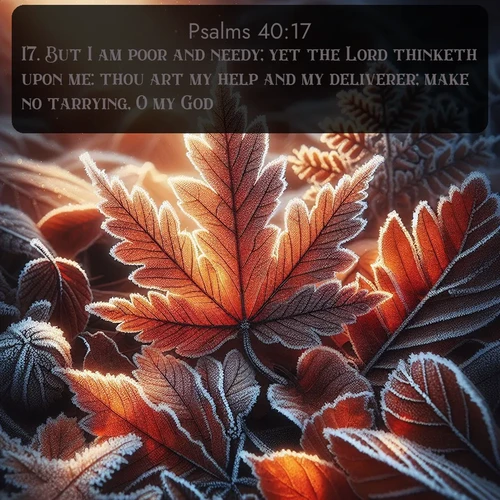Psalms 40:17 plusieurs versions / traductions
English Bible Translations
17. But I am poor and needy; yet the Lord thinketh upon me: thou art my help and my deliverer; make no tarrying, O my God.
17. But I am poor and needy; [Yet] the Lord thinketh upon me: Thou art my help and my deliverer; Make no tarrying, O my God.
17. Though I am poor and in need, the Lord has me in mind; you are my help and my saviour; let there be no waiting, O my God.
17. But I am afflicted and needy: the Lord thinketh upon me. Thou art my help and my deliverer: my God, make no delay.
17. But I am poor and needy; yet the Lord thinketh upon me: thou art my help and my deliverer; make no delay, O my God.
17. And I [am] poor and needy, The Lord doth devise for me. My help and my deliverer [art] Thou, O my God, tarry Thou not.
German Bible Translations
17. Denn ich bin arm und elend; der HERR aber sorgt für mich. Du bist mein Helfer und Erretter; mein Gott, verziehe nicht!
17. (H40-18) Bin ich auch elend und arm, für mich sorgt der Herr. Du bist meine Hilfe und mein Erretter; mein Gott, verziehe nicht!
French Bible Translations
17. Que tous ceux qui te cherchent soient dans l'allégresse et se réjouissent en toi! Que ceux qui aiment ton salut disent sans cesse: «Que l'Eternel est grand!»
17. Que tous ceux qui te cherchentSoient dans l’allégresse et se réjouissent en toi!Que ceux qui aiment ton salutDisent sans cesse: Exalté soit l’Eternel!
17. Moi, je suis pauvre et indigent; Mais le Seigneur pense à moi. Tu es mon aide et mon libérateur: Mon Dieu, ne tarde pas!
17. Et moi, je suis affligé et pauvre: le Seigneur pense à moi. Tu es mon secours et celui qui me délivre. Mon Dieu! ne tarde pas.
17. Or je suis affligé et misérable, [mais] le Seigneur a soin de moi; tu es mon secours et mon libérateur ; mon Dieu ne tarde point.
17. Que tous ceux qui te cherchent s'égaient et se réjouissent en toi; que ceux qui aiment ta délivrance disent sans cesse: Magnifié soit l'Éternel!
Versions with Strong Codes
Psalms 40 / KJV_Strong17.
Strong Code definitions
H589 'aniy an-ee' contracted from H595; I:--I, (as for) me, mine, myself, we, X which, X who.see H595
H6041 `aniy aw-nee' from H6031; depressed, in mind or circumstances (practically the same as H6035, although the margin constantly disputes this, making 6035 subjective and 6041 objective):--afflicted, humble, lowly, needy, poor.see H6031 see H6035&volume=KJV_strong' target='_self' >H6035 see H6035&volume=KJV_strong' target='_self' >H6035 see H6041
H34 'ebyown eb-yone' from H14, in the sense of want (especially in feeling); destitute:--beggar, needy, poor (man).see H14
H136 'Adonay ad-o-noy' am emphatic form of H113; the Lord (used as a proper name of God only):--(my) Lord.see H113
H2803 chashab khaw-shab' a primitive root; properly, to plait or interpenetrate, i.e. (literally) to weave or (gen.) to fabricate; figuratively, to plot or contrive (usually in a malicious sense); hence (from the mental effort) to think, regard, value, compute:--(make) account (of), conceive, consider, count, cunning (man, work, workman), devise, esteem, find out, forecast, hold, imagine,impute, invent, be like, mean, purpose, reckon(-ing be made), regard, think.
H859 'attah at-taw' or (shortened); aatta {at-taw'}; or wath {ath}; feminine (irregular) sometimes nattiy {at-tee'}; plural masculine attem{at- tem'}; feminine atten {at-ten'}; or oattenah{at-tay'naw}; or fattennah {at-tane'-naw}; a primitive pronoun of the second person; thou and thee, or (plural) ye andyou:--thee, thou, ye, you.
H5833 `ezrah ez-raw' or mezrath (Psa. 60:11 (13); 108:12 (13)) {ez-rawth'}; feminine of H5828; aid:--help(-ed, -er).see H13&volume=KJV_strong' target='_self' >H13 see H13&volume=KJV_strong' target='_self' >H13 see H5828
H6403 palat paw-lat' a primitive root; to slip out, i.e. escape; causatively, to deliver:--calve, carry away safe, deliver, (cause to) escape.
H408 'al al a negative particle (akin to H3808); not (the qualified negation, used as a deprecative); once (Job 24:25) as a noun, nothing:--nay, neither, + never, no ,nor, not, nothing (worth), rather than.see H3808
H309 'achar aw-khar' a primitive root; to loiter (i.e. be behind); by implication to procrastinate:--continue, defer, delay, hinder, be late (slack), stay (there), tarry (longer).
H430 'elohiym el-o-heem' plural of H433; gods in the ordinary sense; but specifically used (in the plural thus, especially with the article) of the supreme God; occasionally applied by way of deference to magistrates; and sometimes as a superlative:--angels, X exceeding, God (gods)(-dess, -ly), X (very) great, judges, X mighty.see H433
Prédications qui analysent les thèmes Psaumes 40
Thèmes : Prière d'un affligé; Confiance en DieuRelated Sermons discussing Psalms 40
Themes : Prière d'un affligé; Confiance en Dieusee also: Bible Key Verses ; KJV Bible Images, BBE Bible images

